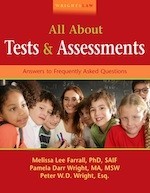Bottom line: Eligibility decisions must be based on comprehensive evaluations.
Terminating your child’s eligibility from special ed is not a unilateral decision the school alone can make. The school is required to do a comprehensive evaluation.
A group of qualified professionals and the child’s parent determine whether or not a child continues to be eligible for an IEP.

IDEA 20 U.S.C. § 1414(b)
Before the school can declassify your child and determine he is no longer eligible for special education, they must reevaluate your child “in all areas related to the suspected disability.” (p. 96, Wrightslaw: Special Education Law, 2nd Edition )
A good example of the reevaluation requirement is in the 2014 OSEP Letter to Blodgett
http://www2.ed.gov/policy/speced/guid/idea/memosdcltrs/acc-13-023542r-mn-blodgett-reeval.pdf
In Blodgett, a child has a documented conductive hearing loss. This child qualified for an IEP under the IDEA category “deaf or hard of hearing.” Surgical procedure corrected the hearing loss and the child is no longer deaf or hard of hearing.
The child’s classification in that category no longer exists.
Is he still eligible for special ed?
Federal Regulations 34 CFR § 300.304(c)
“The evaluation must be sufficiently comprehensive to identify the child’s potential need for special education and related services, whether or not commonly linked to the disability category in which the child was previously identified.”
Long-term Impact of Disability
OSEP is clear that, in this case, “hearing loss during the crucial early years can have a long-term impact on a child’s speech and language acquisition and development.”
“The child’s language needs and whether he qualifies under the “Speech or language impairment” category would be important considerations when evaluating that child’s continued eligibility for services.”
Although the hearing loss has been corrected, the child could be eligible based upon another disability category. And that is why IDEA requires a comprehensive reevaluation.
Assessments of Hearing, Vision, and Motor Skills
 Children who are deaf and hard of hearing are a diverse group. Many children with hearing impairments also have language and communication problems.
Children who are deaf and hard of hearing are a diverse group. Many children with hearing impairments also have language and communication problems.
Some children have sensory impairments that affect both vision and hearing.
If your child has impaired sensory skills, you can expect him to have difficulty learning.
Learn about Assessments of Hearing in Wrightslaw: All About Assessments, Chapter 11, p. 109.





Is there anything in IDEA that defines what can be considered as a part of a comprehensive evaluation? For example, if the adaptive behavior, behavioral emotional and speech/language tests were completed by the school but we as the parents provided educational, and cognitive evaluations that we had done privately a few weeks prior to the meeting? Is the school required to redo the educational and IQ tests or are all of the tests (independent and school completed) considered together as comprehensive evaluation?
District’s only have to consider outside evaluations. So the school can choose to do their own, or accept the outside evaluation. 300.502
I referred my 10th grade son with OCD/ADHD for an assessment in 7th grade when his 504 was not meeting his needs. Following the school assessment, I requested an IEE (feeling school assessment was incomplete).The IEE diagnosed him with SPCD and Dyslexia in 8th grade. He was also identified as 2e, highly gifted in Verbal Reasoning and Visual Spatial Reasoning.
His records are replete with signs of Dyslexia from K-7, yet the district failed to test for this in his initial assessment, and has also failed to provide remediation since diagnosis because he “reads above grade level and gets straight As.” Achieving those grades, however, has been a life-long struggle with intensive support given at home.
District now wants an eligibility review, seeking to disqualify. What can we do?
You need to consult with an experienced special ed attorney to get a clearer sense of your options, given the state you live in. In general, consultations are not expensive and provide parents with a good roadmap for the future.
For lists of attorneys, check the Wrightslaw Yellow Pages for Kids for Your State at https://www.yellowpagesforkids.com/
and
The Council of Parent Attorneys and Advocates at https://www.copaa.org/search/custom.asp?id=1489
What does re-evaluate mean? I’ve seen districts “evaluate” data from goals and objectives, grades and progress monitoring results while other districts complete a new psychoeducational evaluation. I’m confused.
A re-evaluation is a new evaluation, typically a psychoeducational evaluation, to determine where the child is functioning now, whether the child is making acceptable progress in meeting the IEP goals, whether the child has new or different needs that need to be addressed in the IEP. You cannot rely on subjective “measures” like grades and progress monitoring to measure progress and determine the child’s current needs.
What if the child had a reeval in 2018 and did not qualify and this year the parents wants him referred again. Would I do another reeval or an initial evaluation?.
I have been told that the SD questions if my daughter qualifies for an IEP. In mediation agreement the SD agreed to pay for private counselor to provide social and emotional skill-building and they replace those services on IEP. They removed goals and PLAAFP’s from IEP also. IEE done shows sensory issues, slow processing speed, etc. school evaluated a 2nd time and their findings are opposite of IEE findings. They show she has no problems. They want to take away IEP. Because they’re paying for social skills (specialized instruction) and counseling can they remove her from her IEP? I know I can get another IEE but what can I do in the meantime to stop her removal?
If a child was born with sensorineural hearing loss and implanted with cochlear implants at age 1 and 1.5 they are still defined as “deaf”. Can an IEP be taken away and replaced with a 504 if the child has proven himself academically in reading but lagging behind significantly in math. He is a lip reader and a long-term concern is lip reading and note taking with the ability to keep up with the pace as well as understanding and applying terminology of math content. Current age 8 / 3rd grade.
Thank you
Meg,
Before the school can take away a child’s IEP and place him or her on a 504 plan they must reevaluate him/her. The reason is because they need to see with the evaluation that his is overcoming the issues your child is facing. I would email the school (paper trail) requesting a meeting immediately. You can also contact your state and parenting training center they should be able to assist you. http://www.parentcenterhub.org/find-your-center/
Does this also apply to a student with articulation difficulties? If the speech teacher wants to dismiss/exit my child, but I don’t agree. He has been receiving services since he was 18 months and they want to stop services even though he says people can’t understand him and always say “what”? He is almost 9 and a GATE student, but he is hard to understand. The speech teacher says it is not interfering because of he is able to meet standards, even though other kids don’t understand him. Any advice, case law, or current special ed laws you can refer me to?
I received my sons reevaluation report last week and I’ve been carefully reading it. He was given three tests:
Goldman fristoe test of articulation II
PLS5 & Expressive one word picture vocabulary test-4
“His overall speech evaluation indicates that his speech intelligibility is judged to be good at the conversational level. Overall language evaluation is in the average range for receptive & expressive language tasks.” We haven’t had our meeting yet so I don’t know if this may mean they’ll dismiss his IEP because he did well on the tests. Any opinions would be helpful. Thank you. Mary A.
If they should say that he needs to be dismissed from speech, you can request an independent educational evaluation. That will give you something to compare with their testing & recommendations.
Hello. My son was given reevaluation tests recently because his teacher says he has mastered all his goals and may be dismissed from his ESE -AM/PM program & IEP. We are also having his matriculation meeting soon, he starts Kindergarten this fall. I disagree that he should be dismissed from the program, can I see the results of the reevalutaion before having the matriculation meeting? Or would it matter if the results were given to me at the meeting? I’ve posted these questions on a local ESE Facebook group and received some good feedback. Thank you.
Mastering his goals does not mean that he is developmentally where he should be. The sooner you can see this info the better, even if it is only a half hour or hour before the meeting. Also learn about the state rules on disagreeing with the team’s recommendation. Your state parent training & information project can assist you. http://www.parentcenterhub.org/find-your-center
Thank you for the link, I found my local contact for my area. I never knew of that organization, so thanks a lot! I emailed them and hoping for a reply soon. Thank you for your response, everything helps.
Hi M. Ann. It is my understanding that you have the right to have copies of the reevaluation results before any ARD/IEP meeting. Just make certain that you make your request in writing. Make sure that you state that you need these results so that you may be better prepared for the meeting. Access to such data allows you an opportunity for input, asking questions, and making informed decisions as an equal member of the ARD/IEP committee.
Thank you Juan. I appreciate your response and advice. Hopefully I’ll be able to see the results prior to the meeting. I was recently told by his teacher I could not see the results and that’s what the matriculation meeting was for, to go over the test results. I don’t have any dates yet for the meeting, so in the meantime I still have people to contact and inquire about my situation. Thanks again